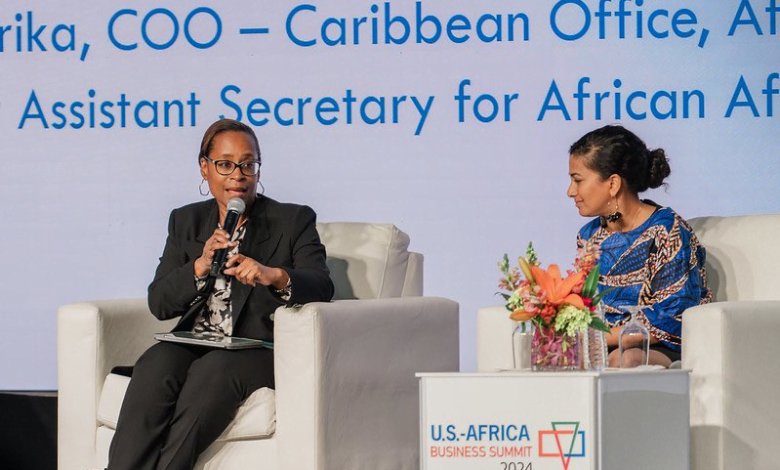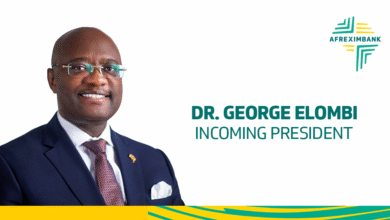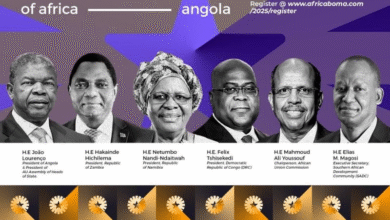US-Africa Summit 2024 : towards a new era of cooperation?
Returning to American soil for its 16th edition, will the US-Africa Summit 2024, held from May 6th to 9th, 2024, in Dallas, mark a turning point in relations between the two continents? This is at least the promise made by over 1,000 prominent political and business leaders from Africa and the United States participating in the meeting.

By Bilkyss Mentari
After Morocco and Botswana, « back at home » for the 16th edition of the US-Africa Summit held from May 6th to 9th, 2024, in Dallas. A choice far from random: the city in the state of Texas, with over 1.3 million inhabitants, the ninth most populous city in the United States, also hosts one of the largest African-born diaspora populations in the United States.
Under the theme « Partnership for Sustainable Success, » the event, which brought together at the Kay Bailey Hutchison Convention Center in Dallas over 1,000 prominent political and business leaders from Africa and the United States, promised to usher in a « new era of cooperation » in USA-Africa relations.
Organized by the Corporate Council on Africa (CCA), the leading American business association focused solely on connecting business interests in Africa, the summit brought together over 1,500 leaders from the American and African public and private sectors, including heads of state, international investors, American and African government officials, and multilateral stakeholders.
Among them were Joseph Boakai, President of the Republic of Liberia; Lazarus Chakwera, President of the Republic of Malawi; Joao Lourenço, President of the Republic of Angola; Mokgweetsi EK Masisi, President of the Republic of Botswana; José Maria Neves, President of the Republic of Cabo Verde; and Hon. Nthomeng Majara, Deputy Prime Minister of the Kingdom of Lesotho.
Equitable and mutually beneficial partnerships
The stated objective: to facilitate in-depth discussions and forge stronger commercial ties between the two regions, with participants representing a diverse spectrum, including heads of state, international investors, government officials, and multilateral stakeholders. The outcome of the exchanges: a shared willingness to enhance cooperation between the two continents.
« The private sector is the engine of economic growth. This summit provides a unique platform to showcase the growth potential of our region and accelerate opportunities for businesses across Africa, » said Niyi John Olajide, President of the CCA and also the head of Cavista Holdings, prior to the meeting.
One of the main agenda items was the promotion of economic and trade cooperation. The United States reaffirmed its commitment to strengthening trade ties with Africa, emphasizing the importance of equitable and mutually beneficial partnerships. Discussions focused on diversifying trade, enhancing investments, and promoting intra-African trade.
Also on the agenda were discussions on sustainable development and energy. Both parties agreed on the urgency of promoting renewable energies and combating climate change. Initiatives to increase access to clean energy, develop sustainable infrastructure, and support the transition to a green economy were discussed in detail. Innovation and technology were also highlighted. Participants emphasized the crucial role of technology in Africa’s socio-economic transformation. Discussions focused on promoting entrepreneurship, developing digital skills, and collaborating in areas such as artificial intelligence, blockchain, and cybersecurity.
Lastly, peace and security, a true guiding principle of American diplomacy. Leaders underscored the importance of cooperation in combating terrorism, transnational crime, and armed conflicts. Strategies to promote regional stability, strengthen security institutions, and foster mediation and peaceful conflict resolution were explored.
The continent is changing, and we are committed to the various initiatives of the administration concerning Africa
« The Export-Import Bank – or as we call it, EXIM – is the official export credit agency of the United States. We were established 90 years ago. EXIM has played a very important role in fostering economic opportunities for American companies and for partner countries with which American companies do business worldwide, » reminded Reta Jo Lewis, President of the Export-Import Bank of the United States. She also announced the signing of three key partnerships for infrastructure and global investments, the PGII projects, in Angola. « The projects we have signed are historic direct loans of over $900 million to support the construction of two solar power plants in Angola. This is the largest renewable energy project and the largest transaction in sub-Saharan Africa in EXIM’s 90-year history (…) Since we concluded our first agreement in Angola in 1942, EXIM has had a strong and reliable trade partnership with Africa. As part of the work we have also done to support American exporters engaging in Africa, we have signed six memoranda of understanding with African governments and institutions, as well as memoranda of understanding with Tanzania and Côte d’Ivoire. Each of these agreements has been designed to facilitate up to approximately $500 million in financing for American exports and deepen trade relations with these countries. We are working diligently with those on the continent where we have signed and begun work under memoranda of understanding totaling about $1.3 billion with the African Export-Import Bank, with the Africa Finance Corporation, and more recently with the Bank of Industry in Nigeria. In total, since I joined EXIM, we have signed about $2.3 billion in memoranda of understanding. So, we recognize that the continent is changing, and we are committed to the various initiatives of the administration concerning Africa. »
Reaffirming U.S. commitment to Africa and U.S. commitment to a 21st-century economic partnership with the continent
« This summit has been successful for us so far, and it’s really exciting to see how much progress has been made in U.S.-Africa trade relations, not only since the U.S.-Africa Leaders Summit in December 2022 in Washington but since I was with so many of you last summer in Gaborone at last year’s CCA Summit, » recalls Joy Basu, Deputy Assistant Secretary of State for African Affairs. Much of the interagency work is focused on energy and infrastructure, as these elements are essential to the work that other industries create. We also signed incredible agreements with USTDA and Malawi, working on battery storage; with DFC and Sierra Leone, working on energy. And we’ve had meetings here to support sectors like health, agriculture, and cross-cutting sectors like ICT. » And she concludes: « I think the goal is really to reaffirm U.S. commitment to Africa and U.S. commitment to a 21st-century economic partnership with the continent. And the work here at the USABS is really contributing to building partnerships with our African governments and African and American private sector to facilitate private sector-led economic growth and prosperity. »
MCC: « of the $17 billion we’ve invested so far worldwide, $10 billion went to the continent »
An opportunity also to review the vehicles for enhancing exchanges between the United States and Africa, such as AGOA or the MCC established in 2004 by President Bush, which thus celebrates its twentieth year. « Since our inception, of the $17 billion we’ve invested so far worldwide, $10 billion went to the continent. We have worked in 24 countries, » said Millennium Challenge Corporation CEO Alice Albright. Thus, in addition to meeting many of our partners, we also announced this week the implementation of our 79th program, a $350 million program in Malawi to help farmers transport their products to market at lower cost and more quickly. » The institution, which also carries out projects in Cape Verde and Mozambique, currently has « active programs worth $3 billion. »
« At the MCC, we are very committed to a very inclusive approach to economic growth. We work in almost every country to find ways to include women and women-owned businesses in our work or small and medium-sized enterprises. So this often takes the form of different reforms needed to enable parts of society that are not usually included to be included. We have wonderful examples – one recently in Lesotho where laws were changed to allow women to become landowners. We just closed a wonderful program in Morocco that provided opportunities to a wide range of people in that country. We have a wonderful program in Côte d’Ivoire, a partnership with Microsoft aimed at bringing digital skills to women entrepreneurs in Côte d’Ivoire. Inclusive growth is therefore at the heart of our work, and I think we are making slow and steady progress in that direction. »
The Biden administration has expressed strong support for the modernization of AGOA. We want to see it continue to be the cornerstone of trade
« The Biden administration has expressed strong support for the modernization of AGOA. We want to see it continue to be the cornerstone of trade, but also to facilitate our use of it and to be more impactful and strategic, » Basu continues before commenting: « American businesses in Africa not only help raise standards (…) What I’m asking our African partners on the continent to do is to develop utilization strategies to increase their use of AGOA, which is a truly incredible unilateral program allowing African businesses to export duty-free to the United States. And we want to see more businesses – small and large – take advantage of it. So, my effort with African partners involved is to increase awareness but also to increase national strategies that will enable small and large businesses to make the most of this advantage. »
This 16th US-Africa Business Summit thus testified to the growing importance of relations between the two continents. As global economies evolve, this strategic collaboration offers unprecedented opportunities to enhance trade, drive innovation, and promote sustainable development in Africa.
In 30 years, the Summit has become a crucible for forging partnerships, exploring new business avenues, and shaping policies that foster strong trade and investment relations between the United States and Africa
As a reminder, the US-Africa Business Summit, the Corporate Council on Africa’s (CCA) flagship annual event, aims to be a platform for deepening commercial ties between the United States and Africa in key sectors, including agribusiness, energy, health, infrastructure, trade facilitation, ICT, and finance. Over 30 years, the Summit has become a crucible for forging partnerships, exploring new business avenues, and shaping policies that foster strong trade and investment relations between the United States and Africa. Historically attracting an average of 1,000 participants from 40 countries, including 46 heads of state since its inception, the Summit reflects the dynamism and evolution of the US-Africa economic landscape.
Since the inaugural summit in 1997, the CCA has successfully brought together stakeholders from around the world to discuss challenges, identify solutions, and increase investments between the United States and Africa. As the 2023 edition marks the fifth Summit held on the African continent in Botswana, the event continues to embody the spirit of collaboration and mutual growth.







